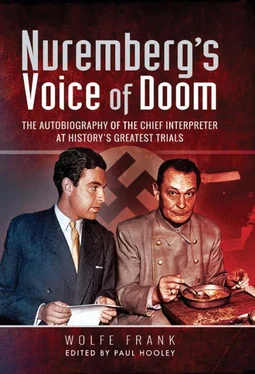Viatour looked at me kindly. Apparently, he had understood most of what I had been saying. Then he grinned and told me his own story. He had been in the Belgian Army since he was fifteen and had completed almost forty years. He also had more medals on his chest than I had ever seen on any officer below the rank of general.
When the Germans had invaded Belgium in 1940 he had, somehow, fallen into the hands of the Gestapo and had been treated very badly. The same applied to the NCOs who had come with him. He fully understood my predicament but did not think that it was serious. Then he said, ‘I myself, and my men, have only one target and that is to fight the Germans as soon as possible. Learning the machine-gun is the first step in that direction but, as we are machine-gunners, specialists, we won’t have a problem. All you will have to do, Monsieur Frank, is to get hold of some pamphlets and we’ll work the rest out together.’
And so we did. To begin with we worked out what might be called ‘the public appearance act.’ We agreed to talk much and rapidly when within the earshot of others. There were to be no clues that I did not understand him or was talking horrible French. This act was always entirely successful.
Then we found a Nissen hut on the perimeter of the camp to which we adjourned daily, at the very reasonable hour of 10.00 hours, which was two hours after the regiment had started on its daily tasks. In order to make up for this we went home an hour before they did, at 16.00 hours.
My conscience might well have pricked me if these men had not been such excellent pupils. They taught themselves. They had forgotten more about machine-gunning than I would ever know. All I had to do was to make them familiar with British drill in connection with the use of the weapon since they would be working in close co-operation with us. The rest they learnt themselves.
After five weeks – a week ahead of the adjutant’s timetable – they knew all there was to know. The CO made enquiries as to progress.
‘We will be through in another week, Sir,’ I said. Following which the colonel thought they ought to be given a test.
‘I’ll tell you what we’ll do,’ announced the Old Man. ‘I’ll write down some questions and you’ll translate them into French. I’ll have the adjutant attend the test. Then you’ll translate the answers and I’ll compute the results.’
This set-up was, of course, quite perfect. I took the questions to our Nissen hut and between us we worked out the answers. I told the Belgians that we could not possibly turn in 100 per cent correct answers. I suggested we make a few mistakes. They wouldn’t hear of it. Finally, Colonel Viatour asserted his authority. He made a list of convincing errors and we drew the victim’s names out of a hat.
Under the eyes of an admiring adjutant my gallant men produced a score of 89 per cent. It was the best result ever attained in the regiment. Naturally.

21. OH, WHAT A LOVELY WAR
AFTER A FAREWELL DINNER for Colonel Viatour and his men, I was again summoned to the adjutant’s office. ‘I’m frightfully pleased with that Belgian cadre you’ve been running,’ he announced. ‘take a long weekend and when you come back you’ll be on your way to France.’
It looked as if I might get into the war.
I went off to London with feelings ranging from elation to apprehension and fear. They presented an excellent excuse for man’s favourite remedy against such an emergency. I got very drunk indeed and stayed that way for seventy-two hours. I met a very lovely new friend at the Mayfair Club by the name of Sylvia. She was endowed with outstanding measurements and a cosy, old-fashioned flat in Kensington. I took no time off for sleeping.
Pale and hung over, I arrived back at camp just in time for the first parade. I staggered into the Company Office and arranged with a friend that he would take over my duties so that I could go to bed. However, I encountered the Company Commander on the way out.
‘Ah, Frank! Good morning. Glad you’re back.’ He smiled. ‘I have a job for you, old man. Would you mind taking B and C platoons for rugger touch?’
I did mind, but he wouldn’t have been interested. I changed into PT clothes and, shivering, I went out into the cold morning air.
Rugger touch is a game with very few rules. It is part of the toughening-up programme for British soldiers. There are two goals, marked in this instance by tin canisters, and the object of the exercise is to shoot goals, no holds barred. The particular attraction for the men in that training regiment, was that the game provided an opportunity for them to beat up their officers. Of course, it was all done in the best of fun.
B and C platoons got cracking. For a minute or two, I ran up and down aimlessly, thinking of Sylvia. Then I suddenly remembered what I had been taught relentlessly for many a month – ‘Officers will be an example to their men at all times and display leadership and initiative.’
I put my head back on and got hold of the ball. B platoon set out to tackle me. C platoon attempted to protect me. All at once about thirty men descended upon me and I found myself at the bottom of the heap. I was still clutching the ball. The two opposing teams pulled hard. What they were pulling happened to be my leg. There was a rather audible crack. The leg had broken.
I was out of the war!
Later that day I drew up a temporary balance. (I had just lost a one-pound bet to a sergeant who said my leg was broken and I said it wasn’t. This was before the sixth X-ray produced a reasonably clear picture).
I had been in the Army four years and two months, or one thousand five hundred and thirty days to be exact. Discounting the useless days of digging holes, I had spent eighteen months being trained as a tank driver, an infantry soldier, and, finally, an Infantry Support Officer. The object had been to get into the war as a fighting soldier. Now, in February 1945, with the war nearly at an end, it was fairly obvious that it had all been in vain, every bit of it. The doctor’s verdict was one month in plaster followed by one month of physiotherapy – and I would not be fully fit for four to five months after that.
Moston Hall Military Hospital at Chester was a very busy place. They put the leg into a plaster cast (it was done by a private soldier and no doctor had seen me) and then took the cast off again because they didn’t like the look of it. They then ordered my immediate transfer to a convalescent home, however when I got out of bed and put some weight on the walking plaster I passed out with pain and it was decided that I should stay a bit longer.
The next morning, a newly operated case was wheeled into the ward. When he came to he immediately put his hand under the blanket obviously checking something. He sighed and went back to sleep. Later, I asked him what it was all about. He told me he had been lying on a stretcher outside the operating theatre, quite doped, when a medical orderly walked up to another semi-conscious type next to him. ‘You’re next, Captain Watson,’ said the orderly. My friend’s name was Watson. The other fellow’s name was Wilson.
Watson had a hernia on the right. Wilson had time to murmur that he had a hernia on the left. So, all the way through the anaesthetic, Watson was worrying whether Wilson, mistaken for Watson, would be sliced open on the wrong side, and he, Watson, also. All was well, however, the holes were where they belonged. My other neighbour, a young guards officer, was one of those cases of a man who, according to the book, ought to have been dead. He had been run over by his own machine-gun carrier. His insides, according to his own version of the incident, ‘Were hanging out all over the place, but some chap had labelled them, numbered the lot and put them back in.’
Читать дальше













